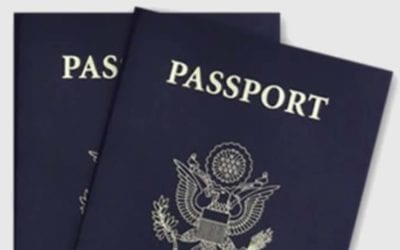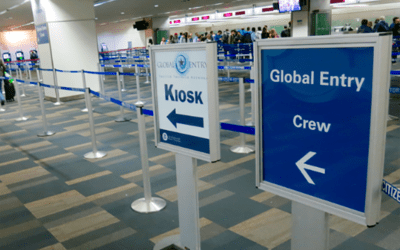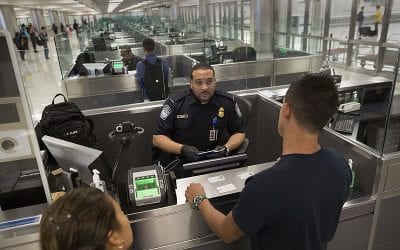Arriving in a foreign nation by air is not difficult upon landing. However, crossing international land borders can be tedious and nerve-wracking.
 Crossing international land borders can be tricky. By air, if you have a passport valid for your destination and all other necessary documentation, it can be a breeze. On the other hand, crossing an international border by land can be tedious and nerve-wracking.
Crossing international land borders can be tricky. By air, if you have a passport valid for your destination and all other necessary documentation, it can be a breeze. On the other hand, crossing an international border by land can be tedious and nerve-wracking.
Sometimes land crossings are easy, but more often than not they’re complicated. This can be especially true if the countries on each side of the border aren’t on the best of terms.
I’ve experienced crossing international borders many times. Some crossings took as long as three hours and required substantial cash payments in different currencies, and being questioned and having luggage inspected by both countries. Once, my crossing required a 200-foot, smelly, filthy, sweltering 20-minute bus ride.
Here’s my advice for crossing international borders by land:
Research is the most critical component for travelers planning to cross an international land border.
Research:
Countries have specific rules for traveler documentation, with passports and visas being just the start. You may need an International Certificate of Vaccination, proof of reciprocity fee payment, etc. You may need local currency for your entry fees. Make sure it’s in fresh, crisp bills, as often border officials are suspicious of old, wrinkled currency.

Countries may have specific rules on vaccinations and limits on currency. Some nations may have severe restrictions on what over-the-counter and prescription drugs you may bring into the country. The penalty for bringing in banned drugs can include jail.
Be sure you know what time your border crossing is open. Not all crossings are open 24/7. Make sure you have all the documents you need for the border crossing you’ll use. In addition, try to avoid small crossings not accustomed to tourists, where border officials have time on their hands.
Note: Keep checking on your destination(s) requirements regularly, right up to your departure. Fulfilling each destination’s requirements is up to you and foreign nations aren’t required to give notice when they change their laws and regulations.
Just because your passport hasn’t expired doesn’t mean your destination country will consider it valid for a visit to their nation.
Passport:
You’ll need a passport to cross an international border, unless there are special rules, such as for U.S. citizens crossing by land into Canada or Mexico. For numerous countries, the fact that your passport hasn’t yet expired is meaningless. Many countries require passports to be valid for at least three months after a traveler’s departure, while 50 nations require it to be valid for six months after departing their nation. To ensure I fulfill those requirements, I normally renew my passport a year prior to its expiration.
Worn passports:
Border personnel will often reject passports with fewer than two or more completely empty passport pages, or passports that are worn, creased, bent or have pages with turned-down corners. Some countries won’t accept emergency passports. It that’s your passport, renew it immediately.
Don’t bring it with you:
Don’t bring guns, ammo, lots of cash, fresh fruit or flowers to any international border. Be careful of books or photographs not favorable to Islamic morals, principles and teachings if traveling to an Islamic nation. Many countries like Rwanda and Tanzania prohibit tourists from bringing plastic bags into their countries.
Use common sense when speaking to officials. Answer questions directly, truthfully, and politely and never make jokes anywhere within their earshot.
When you speak to border officials:
When questioned, remember that working in your destination country as a tourist is illegal, so if you might do a little freelance work there, particularly if you have a laptop or tablet with you, avoid speaking about it. Answer questions directly and truthfully. Don’t volunteer extra information. Don’t make jokes about anything. Border officials will take everything you say literally. It won’t matter what you mean.
Be polite at all times when at the border:
There’s typically a lot of tension at the border on the part of government officials and visitors. You are wise to remember that border officials have all the power. You should take a commonsense strategic approach. Be polite and patient. No matter what happens, you should leave any “attitude” in check.
Border officials will profile you by appearance, so look presentable and dress modestly.
Appearance:
There’s no reason that you can’t travel comfortably, even when crossing an international border. Still, at the same time, by your choice of clothing and your general appearance you don’t want to give border officials a reason to think you’re carrying contraband or don’t have adequate funds. Look presentable and dress modestly. That’s particularly true of women. Keep valuables out of sight so you don’t make yourself a target.
Bring a pen and a small notebook:
While you can borrow a pen at the border to fill out forms, waiting for someone to give you one might waste a lot of time. Bring a small notebook, as it can be convenient.
Adequate finances for the duration of the trip:
Some countries require visitors to prove they have enough money to be able to afford their stay and depart on time. Cash and credit cards are standard proof, but you may have to prove you’re gainfully employed. If you’re young and don’t look like you have many financial resources, you will be asked about your ability to pay your bills and depart your country on time.
No photos or videos at the border under any circumstance.
Forget about taking photos at the border crossing:
Border control is considered a high-security area by most nations. Taking photos and videos may be illegal and will at least make you look suspicious to border officials, particularly if they are in them. At best, you’ll likely be questioned. You probably be required to delete the images and videos. Your cell phone or camera might be thoroughly searched or confiscated. You might even be detained or possibly jailed.
Crossing borders with others is better than solo crossings:
At many border crossings, men traveling alone are often profiled as potential troublemakers by officials. Moreover, especially for women, traveling with someone else makes you much less vulnerable to trouble at border crossings, particularly at smaller outposts. If you’re alone, but others are crossing simultaneously, chat them up to appear that you’re with them.
Not all countries permit rental cars to cross their borders.
Rental cars across borders:
Crossing international borders with a rental car can be problematic. Make sure that you can cross the border with your rental car. There are some borders where crossing in a rental car is prohibited. If you can cross the border, ensure your vehicle, lease, and insurance are valid at your destination. Ensure you have all necessary car, insurance, and driver documentation and that it’s in order.
Before you leave the border:

Following my advice won’t necessarily eliminate every problem at every border, but it will make crossing the border easier than ignoring it. I’ve crossed international borders by land more often than I remember. This advice works.
READ ALSO:
Car rental companies turn to old rental scams
Airlines penalize travelers who book far in advance with unfair ticket validity rules
After many years working in corporate America as a chemical engineer, executive and eventually CFO of a multinational manufacturer, Ned founded a tech consulting company and later restarted NSL Photography, his photography business. Before entering the corporate world, Ned worked as a Public Health Engineer for the Philadelphia Department of Public Health. As a well known corporate, travel and wildlife photographer, Ned travels the world writing about travel and photography, as well as running photography workshops, seminars and photowalks. Visit Ned’s Photography Blog and Galleries.



